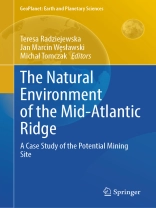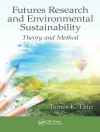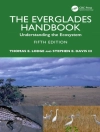The book presents the first comprehensive description of parts of the Mid-Atlantic ridge subject to a contract for polymetallic sulphide exploration between the International Seabed Authority and the Ministry of Environment of the Republic of Poland. The state-of-the-art of the study area presented here takes into account a variety of aspects, including hydrological and meteorological conditions, hydrography, optical properties of water, seafloor morphology, geology, sediments and sedimentation processes, pelagic environment and its biocoenosis, benthic organisms, seabed communities, deep-sea environmental protection, as well as many other. Also, the research methods and tools are enumerated, and the studies advised for the future are outlined. The Atlantic seabed area described in this monograph is situated near the central part of the Mid-Atlantic Ridge (MAR), one of the major geological formations on Earth, featuring – like other mid-oceanic ridges – active and inactive hydrothermal vent fields with their unusual and unique ecosystems. The commercial interest in MAR exploration is due to the deposits of massive polymetallic sulphides, formed as a result of hydrothermal fluid precipitation.
สารบัญ
Introduction.- Part A: Abiotic Environment.- Hydrological And Meteorological Conditions In The Contract Area.- Seafloor Morphology, Geology, Sediments And Sedimentation Processes.- Part B: Biology And Ecology.- Pelagic Enviroinment And Its Biocenoses.- Benthic Organisms.- Seabed Communities.- Part C: Research Methods.- Deep Sea Research Methods To Be Used During The Exploitation Of The Mid-Atlantic Ridge Polymetallic Sulphide Areas.- Part D: Environmental Protection And Conservation; Legal Framework.- Deep Sea Environmental Protection And Conservation Issues As Applied To The Mar Ecosystem.- The Legal And Regulatory Framework For Protection And Conservation Of The Deep Sea Floor With A Particular Reference To The Mid-Ocean Ridges: A Summary.- Ecosystem Valuation And Monitoring.
เกี่ยวกับผู้แต่ง
Teresa Radziejewska, professor at the University of Szczecin, specialising in benthic meiofauna and deep-sea ecology; participated in research on Pacific’s Clarion- Clipperton Zone polymetallic nodule
field as well as in a number of projects associated with activities of the International Seabed Authority activities.
Jan Marcin Węsławski, professor at Polish Academy of Sciences’ Institute of Oceanology, specialising in marine ecology and climate-biodiversity relationships; most of his research is focused on the European Arctic, including deep North Atlantic areas.
Michał Tomczak – Ph D, chief geologist at the Polish Geological Institute - National Research Institute, scientific chief of the Polish contract with the International Seabed Authority for exploration of seafloor massive sulphides (SMS) within the Mid-Atlantic Ridge.












